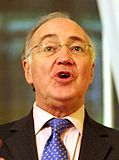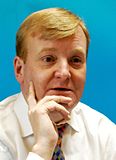United Kingdom general election, 2005
|
|
|||||||||||||||||||||||||||||||||||||||||||||||||||||||||||||||||||||||
|
|||||||||||||||||||||||||||||||||||||||||||||||||||||||||||||||||||||||
|
|||||||||||||||||||||||||||||||||||||||||||||||||||||||||||||||||||||||
|
|
|||||||||||||||||||||||||||||||||||||||||||||||||||||||||||||||||||||||
| Colours denote the winning party, as shown in the main table of results. * Indicates boundary change – so this is a nominal figure ^ Figure does not include the speaker |
|||||||||||||||||||||||||||||||||||||||||||||||||||||||||||||||||||||||
|
|||||||||||||||||||||||||||||||||||||||||||||||||||||||||||||||||||||||
| 1997 election • MPs |
| 2001 election • MPs |
| 2005 election • MPs |
| 2010 election • MPs |
* Indicates boundary change – so this is a nominal figure ^ Figure does not include the speaker
The United Kingdom general election of 2005 was held on Thursday, 5 May 2005 to elect 646 members to the British House of Commons. The Labour Party under Tony Blair won its third consecutive victory, but its majority now stood at 66 seats compared to the 160-seat majority it had previously held. As of 2015, it remains the last Labour general election victory in the UK.
The Labour campaign emphasised a strong economy; however, Blair had suffered a decline in popularity even before the decision to send British troops to invade Iraq in 2003. The Conservative Party, led by Michael Howard since late 2003, campaigned on policies, such as immigration limits, improving poorly-managed hospitals and reducing high crime rates, all under the slogan 'Are you thinking what we're thinking?'. The Liberal Democrats, led by Charles Kennedy, were opposed to the Iraq War given that there had been no second UN resolution, and collected votes from disenchanted Labour voters.
...
Wikipedia




